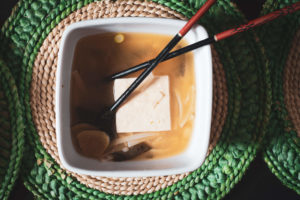Health Benefits of Miso
People in Japan start their days with a cup of miso soup, which is said to aid digestion and energise the body. Miso paste is prepared from fermented soybeans and grains and includes millions of beneficial bacteria, making it a common element in Japanese and Chinese diets. Miso comes in hundreds of varieties, each of which is associated with regional cuisines, identities, and flavours.
Because it provides an instant flavour base, the protein-rich paste is extremely popular. All kinds of meals, including soups & broths, salad dressings, vegetables, stews, glazes, and marinades, benefit from the addition of the fifth taste, known as “umami.” Yes that desired umami flavour you hear all the chefs talk about.
Miso is rich in essential minerals and is a good source of various B vitamins, vitamins E, K, and folic acid as well as vital minerals such as copper, manganese, and zinc. As a fermented food, miso nourishes the intestines with beneficial bacteria that help us stay healthy and happy; good gut health is linked to our general mental and physical health. 🙌🏻

Due to the fermentation process, miso is rich in enzymes. Fermentation increases the number of beneficial bacteria in foods. By consuming fermented foods, you add beneficial bacteria (known as probiotics) and enzymes to your overall gut flora and are thought to aid a wide variety of health problems, especially for the digestion, absorption, assimilation of nutrients and strengthen the immune system.
Miso has a high salt content and should be used in moderation, with no more than 6 grammes per day.
There has been a lot of study done on the health benefits of eating soy products. Despite the fact that miso is manufactured from soy beans, the amount taken is insignificant and unlikely to have a significant oestrogenic effect.
Soybeans that have been genetically modified (GM) are commonly used in the production of soy products. Check the label to ensure that the miso is made from organically farmed, non-genetically modified soy beans. If the miso is gluten-free, it will be stated on the label.

Health Benefits of Tofu
Tofu, like many soy dishes, has its origins in China. It was discovered over 2000 years ago, according to legend, by a Chinese cook who accidently curdled soy milk when he added nigari seaweed. Tofu was first introduced to Japan in the ninth century and was originally known as ‘okabe.’ It wasn’t until 1400 that its contemporary name was coined. Tofu was introduced to Western countries in the 1960s as a result of a growing interest in healthful eating.
It’s made by curdling fresh soya milk, squeezing it into a solid block, and cooling it, just like typical dairy cheese. The whey is removed, and the curds are pushed together to form a strong link.
Tofu is high in anti-inflammatory and antioxidant phytochemicals, making it an excellent anti-inflammatory food. In addition to fibre, potassium, magnesium, iron, copper, and manganese, tofu is a rich source of ‘complete’ protein, which means it has a well-balanced amino acid profile. Talk about a one-stop shop for food and when you combine them…you have Miso Tofu Soup!

Miso Tofu Noodle Soup
This miso tofu noodle soup recipe is healthy and easy to make.
Tofu is a food made from condensed soy milk that is pressed into solid white blocks in a method close to that of producing cheese.
Tofu is rich in protein and contains all of your body's essential amino acids. It also contains fats, carbohydrates, as well as a variety of vitamins and minerals.
Ingredients
- 1 tablespoon miso paste
- 1 sheet nori, finely shredded
- 10g ginger, thinly sliced or grated
- 2 spring onions, finely chopped
- 300g firm tofu, cubed
- 120g rice noodles
Instructions
- In a large saucepan, bring 6 1/2 cups water to the boil.
- Reduce heat, add miso and stir.
- Add nori, ginger, spring onions, and tofu. Cook gently, stirring occasionally, for 5 minutes.
- Add noodles and cook for 2-3 minutes.
- Add a little chilli oil or fresh chilli.
- Serve!
Notes
Recipe Modifications
Add fresh asian mushrooms like oyster or shitake and your favourite greens like broccoli to make it even more delicious and nutritious.
Nutrition Information
Yield 2 Serving Size 1Amount Per Serving Calories 215Total Fat 9gSaturated Fat 1gTrans Fat 0gUnsaturated Fat 6gCholesterol 0mgSodium 340mgCarbohydrates 20gFiber 3gSugar 2gProtein 18g
Nutrition composition will vary depending on the exact ingredients used. This nutrition analysis is a guide only.
Comments +